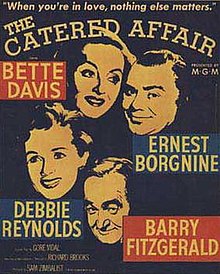The Catered Affair
| The Catered Affair | |
|---|---|

Theatrical release poster
|
|
| Directed by | Richard Brooks |
| Produced by | Sam Zimbalist |
| Written by | Gore Vidal |
| Based on | TV play by Paddy Chayefsky |
| Starring |
Bette Davis Ernest Borgnine Debbie Reynolds Barry Fitzgerald Rod Taylor |
| Music by | André Previn |
| Cinematography | John Alton |
| Edited by | Gene Ruggiero Frank Santillo |
| Distributed by | Metro-Goldwyn-Mayer |
|
Release date
|
|
|
Running time
|
92 min. |
| Country | United States |
| Language | English |
| Budget | $1 million |
| Box office | $1.5 million |
| "The Catered Affair" | |
|---|---|
| 'Goodyear Playhouse' episode | |
| Episode no. | Season 4 Episode 17 |
| Directed by | Robert Mulligan |
| Written by | Paddy Chayefsky |
| Production code | Showcase Productions |
| Original air date | 22 May 1955 |
| Guest appearance(s) | |
The Catered Affair (1956), also known as Wedding Party, is a family drama film made by Metro-Goldwyn-Mayer. It was directed by Richard Brooks and produced by Sam Zimbalist from a screenplay by Gore Vidal, based on a television play by Paddy Chayefsky. The film score was by André Previn and the cinematography by John Alton.
The film stars Bette Davis, Ernest Borgnine, Debbie Reynolds, Barry Fitzgerald and Rod Taylor. It was Taylor's first film for MGM after having been signed by the studio to a long-term contract.
Agnes Hurley (Davis) is a disillusioned housewife, married to Bronx cabdriver Tom Hurley (Borgnine). She wants something better for her daughter, Jane (Reynolds). When Jane announces her engagement to Ralph Halloran (Taylor), Aggie sees this as an opportunity to have a romantic elaborate wedding, with caterers and all the trimmings, like she never had because they could never afford it. However, the daughter does not want it because it is causing awkward conflicts with her family and friends, and her father has been saving that money for many years to purchase a taxi medallion and become self-employed. The film deals with the ensuing money troubles and conflicts within the family, which also involve Uncle Jack Conlon (Fitzgerald) and most of the neighborhood. It is not until the end of the film that the mother realizes that it is the happiness of her family, rather than the expensive ceremony, that is most important, as they go off to watch their daughter get married at their church in the new taxi.
...
Wikipedia
